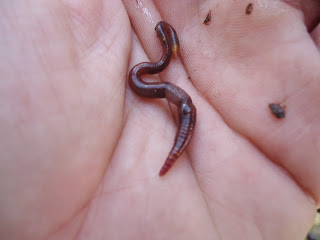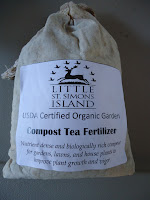It is said that Charles Darwin began and commenced his career with the study of the Earthworm:
"It may be doubted whether there are many other animals
which have played so important a part in the history of the world
as have these lowly organized creatures"
 |
| "Red Wiggler" Worm (Eisenia Fetida) |
With the arrival of Fall, the vermicomposting worms on LSSI have gotten very busy turning our food waste (about 150lbs a week)
into a much needed organic fertilizer for the garden.
These Red Wigglers prefer temperatures in the 70's and 80's. As a sign of cooler days ahead, we are beginning to see the presence of the band seen on the worm above. It's called the clitellum and it is the indication that the worm has reached reproductive age .
Each mating worm will release a cocoon with 8 to 11 eggs,
The hatchlings will in turn become reproductive themselves in 60 to 90 days.
These vermicomposting worms "process" food scraps into fertilizer in about 2 months time. That's about 200 pounds of castings, every 2 months, from each of the wooden bins pictured below!
And what that means for us is whole lot of worm castings for our organic garden!!
These worm castings ---known as BLACK GOLD by farmers and gardeners--- provide plant nutrients, micro nutrients, and
growth compounds for healthy plant development and inoculate the soil with
beneficial bacteria and fungi.
Increasing microbial activity in the soil benefits the garden by
increasing organic matter, preserving soil moisture, and storing nutrient in
the soil. This improves the plant’s resistance to disease and pests as well.
We use our vermicompost castings in the garden in several ways; added directly into the garden beds, in our seedling trays for plant propagation, by making "compost tea". Small quatities of castings are of exponential value when made into a liquid fertilizer and used as a foliar spray or soil drench. This 1 lb. bag will affectively cover 1 acre of garden, yard, or farm.
Vermicomposting on LSSI has made growing an organic vegetable garden at the beach possible.
Think what it could do elsewhere!
Vermicomposting is a simple composting method appropriate and useful for urban dwellers, farmers, schools and other institutions alike looking for a sustainable resource management tool.
For more information on Vermicomposting refer to the book "Worms Eat My Garbage" by Mary Appelhof and come visit the USDA Certified Organic Garden on Little St. Simons Island.



